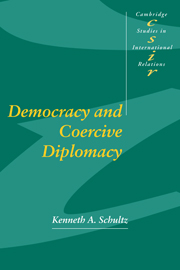Book contents
- Frontmatter
- Contents
- List of figures
- List of tables
- Preface
- 1 Introduction
- Part I Theory
- 2 Information and signaling in international crises
- 3 Democratic politics in international crises
- 4 Domestic competition and signaling in international crises
- Part II Empirical analysis
- Appendices
- References
- Index
- CAMBRIDGE STUDIES IN INTERNATIONAL RELATIONS
2 - Information and signaling in international crises
Published online by Cambridge University Press: 08 October 2009
- Frontmatter
- Contents
- List of figures
- List of tables
- Preface
- 1 Introduction
- Part I Theory
- 2 Information and signaling in international crises
- 3 Democratic politics in international crises
- 4 Domestic competition and signaling in international crises
- Part II Empirical analysis
- Appendices
- References
- Index
- CAMBRIDGE STUDIES IN INTERNATIONAL RELATIONS
Summary
The natural starting point for an inquiry into the effects of democracy on war is some consideration of the factors that cause international disputes to become crises and crises to escalate into wars. A fully specified theory of war is, of course, well beyond the reach of a single book, much less a single chapter. The aim here is to lay out, in a general manner, some of the core strategic issues that arise when states bargain in international crises. In particular, this chapter motivates the book's emphasis on the informational properties of domestic political institutions by demonstrating the role that information plays in accounting for crisis behavior and outcomes. It considers the difficulties of bargaining under conditions of incomplete and asymmetric information, the role of threats and other signals, and the counterintuitive relationship between preferences and outcomes that can arise under uncertainty. Using these insights, it builds a baseline model of crises into which we can later embed a model of democracy.
The focus on uncertainty arises from a simple observation: War is an extremely risky and costly way for a state to pursue its interests. The human losses are the most obvious of these costs. There are also financial and economic costs in terms of forgone consumption, investment, and economic growth. For the governments that choose to bring their countries into war, there are serious political risks as well. A number of recent studies have emphasized the link between government survival and war outcomes, and all of them suggest that political leaders expose themselves to the prospect of removal – or worse – when they chose to wage war (esp., Bueno de Mesquita, Siverson, and Woller 1992; Bueno de Mesquita and Siverson 1995; Goemans 2000).
- Type
- Chapter
- Information
- Democracy and Coercive Diplomacy , pp. 23 - 56Publisher: Cambridge University PressPrint publication year: 2001
- 1
- Cited by



